- Home
- Anne Frasier
Hush Page 2
Hush Read online
Page 2
The walls were filled with many years' worth of awards. Abraham's navy-blue jacket, which hung over the back of his chair, was adorned with medals, his desk with family photos. He had a lot to be proud of. Superintendent Sinclair was a black man who had worked hard to tear down racial barriers. He'd established the domestic violence program and was the single driving force behind Chicago's drastic drop in homicides. He'd worked hard to open up lines of communication between officers and citizens, blacks and whites, rich and poor. He was a role model for everyone, and other cities looked to him as a shining example.
Sinclair glanced up from his phone conversation, waving Max into a chair, which Max ignored. Not a command, only a suggestion. Max would rather stand. He'd rather pace.
Sinclair swiveled in his chair, turning his back on Max. "I'm going to have to call you later," he said, quickly ending the conversation. He hung up, then swung around and looked Max in the eye, interlacing his fingers together over a thick file folder that Max noted was labeled "Madonna Murders."
"It's my granddaughter's birthday," Abraham announced.
Abraham had always had a way of mixing his two worlds—something Max didn't do. Max didn't chat about his son when he was at work, and he didn't talk about work to his son. In that way he hoped—foolishly, perhaps—to keep Ethan from being touched by bad things.
Max got to the point. "You wanted to talk to me about the mother and son homicide?"
"I wanted to let you know that I'm bringing in somebody else to help on the case."
"FBI?" It was unusual for someone to come in from the outside unless he was FBI.
"No. Her name's Ivy Dunlap."
"Dunlap? What are her qualifications?"
"She has a degree in criminal psychology. Teaches at the University of Guelph—"
"Guelph?"
"Ontario."
When Max thought deeply he didn't make eye contact until the idea formulated somewhere in the room. Then, bang, his eyes locked with Abraham's—the equivalence of snapping his fingers.
"Isn't she the one who came up with some in-depth theory about something she called symbolic murder? Some bullshit about serial killings representing metaphors of the unconscious mind?"
"I wouldn't call it bullshit." Abraham seemed disappointed that Max had remembered.
Max suspected this was someone working on a story, wanting to get the "real, inside picture." But what that kind of person really wanted was a sanitized version of some of the most horrific crimes being committed in the world today. Max didn't want to be a part of it. "I don't want some damn novice screwing up evidence, passing out at crime scenes," Max said. You could be straightforward with Abraham. That's what made him such a good Superintendent. And they'd been friends for years.
"Give her a chance. She's a professional. I think she'll be an asset."
"Why somebody from Canada?" Canada had its share of psychotic homicidal maniacs like the Scarborough killer, who hung his victims on fences, but the country's entire count didn't add up to Chicago's tally. "It doesn't make sense."
Years ago, Max probably would have been given some speech about the world not making sense, and how he just had to obey when given orders. Now Abraham Sinclair, man of the new millennium, pushed himself to his feet and said, "I have to get going. Got to get a birthday present."
The closer Abraham got to retirement, the less interested in work he became. Burnt-out, Max figured, but also mentally moving on, moving away, moving forward to time spent with his granddaughter, winter vacations in Florida.
Max stared at him, suddenly wondering if Abraham and this Dunlap person had something going. If that were the case, why hadn't he mentioned her before? Max had known Abraham a long time. Through his divorce, his battle against the alcoholism that was so much a part of Homicide. As were broken relationships. It was hard to work with the horrors they saw on a daily basis, then go home and watch sitcoms with your wife, or talk about what kind of wallpaper would look best in the bathroom. Even a child's fever seemed trivial in comparison to what they dealt with every day.
"She's flying in tomorrow. I'm picking her up and bringing her to Grand Central," Abraham said. "I want you to let her in on everything pertaining to the case." He picked up the folder and handed it to Max. "See that she gets this."
"Over half the information in this folder is classified."
"She's to have access to it."
"We can't risk having her leak any of it to the press."
"That isn't going to happen. And you know damn well this is no reflection on you. I assigned you to the case because you're the best and I knew you wouldn't need any hand-holding."
Bringing Dunlap in was obviously important to Abraham. He wouldn't stick his neck out if it wasn't. But sometimes when women were involved guys did stupid things. He'd seen it happen over and over. He wouldn't have expected a tough guy like Abraham to fall so hard, but Max knew nobody was immune, especially if mind-blowing sex was involved.
So he came right out and asked. "Are you sleeping with her?"
Abraham sighed, his reaction answer enough. "Let it go, Max. If I could tell you more, I would, but I've told you too much already."
That was enough for Max. He let it go. If Abraham thought Dunlap should be involved in the case, then she should be involved in the case. Max couldn't help that he didn't have the time or patience to deal with her.
Abraham shut off the fan, grabbed his jacket, and headed for the door. "What should I get her?" he asked.
"Get her?" Was he getting the woman a welcome gift?
"My granddaughter. She's six. What do six-year- olds like?"
"Hell if I know. I have a sixteen-year-old, and I don't know what he likes."
"Better get it figured out. You're running out of time."
Max was trying to face that ugly reminder when Abraham threw him a new, more harmless one.
"Got your Web page done?"
Not that again. "I don't need a Web page."
"Gotta have a Web page. It's one of the simplest ways to keep the lines of communication open. My page has a smoking gun."
Side by side, they left the building, small-talking to the parking lot, where Max told the older man goodbye before ducking inside his car, dropping the murder file on the passenger seat. He checked his voice mail on his mobile phone, disappointed but not surprised to find that Ethan had failed to leave a check-in message the way he was supposed to. They'd had another blowup last night, and Ethan was never cooperative after a battle.
Instead of heading to Grand Central and his office as he'd originally planned, Max turned in the direction of home.
Ethan was on probation after being caught with beer. The last year hadn't been easy, and Max was afraid this was just the beginning.
Max had hoped Ethan's summer job would have been the answer to their problems. Working twenty hours a week combined with hockey practice and summer-league tournaments should have kept any kid out of trouble. But lately Ethan seemed to be able to find trouble in the most harmless of places.
Max's parents in Florida had offered to take Ethan for the summer, as had his brother in Virginia, but Max was afraid three months away would only make things worse. They needed to spend more time together, not less.
When he was little, Ethan used to love the idea that his dad was a policeman. For Halloween, he always had to wear a blue uniform and badge. And even when it wasn't Halloween, he'd cruise through the house in his little policeman outfit, making siren sounds, pulling over imaginary people and writing out tickets.
But recently everything had changed, and suddenly being a cop was about the uncoolest thing a guy could be. For Ethan, it seemed to represent everything he hated and resented about Max. Max told himself it was just Ethan's age, that in a couple of years everything would be okay, that their relationship would be back to normal. But what if that didn't happen?
When you're young, you keep thinking things are going to change, things are going to get better. But by the time yo
u hit forty, you pretty much know this is it.
When Ethan was hardly more than a baby, they'd lived in the heart of Chicago, but Max had worried that it wasn't a good place to raise a kid, so they'd moved to the suburbs, to a brand-new community northwest of the city that had shot up overnight out of someone's cornfield. It made it a lot harder to get to and from work, but Max had figured it was worth it.
But the pop-up suburb had an incomplete feel to it, like something that just wasn't right, wasn't quite real, almost like a movie set. When people raised families in that sterile environment, it produced directionless children who became directionless teenagers, then directionless adults. With no roots, no past to stand on, you got hollow kids.
The United States was full of rootless, empty kids who played video games all day. In between, they skateboarded down immaculate sidewalks past yards that had never known a weed. And if you looked into their eyes, you didn't see a dream of the future there, just a weird emptiness. Max didn't know what the answer was; all he knew was that somewhere along the line, they'd all taken a wrong turn.
Max had been thinking about moving back to the old neighborhood, but just days ago he'd driven by only to find his entire block gone. In its place he found a parking ramp, a store that rented video games, and a Starbucks. Anytown, U.S.A. Did people really want that? Who decided on that sameness? How had it happened? When Thomas Wolfe said you could never go home again, he hadn't meant because the damn place was gone. Something like this had never occurred to Wolfe. This cleansing.
Sometimes Max just wanted to stop in one of those huge hardware stores, buy some color in gallon cans, and paint his house purple. Not that he was terribly fond of purple, but someone needed to take a stand.
When Max got home Ethan wasn't there and hadn't left a note.
Shit.
Max hoped he wasn't in for a replay of last night's broken curfew.
At 1:30 A.M. the night before, Max had heard the sound of the front door. He'd gotten out of bed and turned on the hall light just as Ethan was tiptoeing to his room. Under the glare of the ceiling light, Max had seen that Ethan's eyes were bloodshot. Smoking dope again.
"You're grounded," Max had said. It was the only thing he knew to say, even though he was fairly sure the words meant nothing, just like Ethan's probation.
Then Ethan had spoken a line that had been said too often in the last fifty years in houses all across the country. "You can't tell me what to do. You're not my real father." It was a cliché that actually hurt. It didn't seem possible, but there it was.
God knew he loved the kid more than life itself— but damn, he could be such a pain in the ass.
"I want to find my real father," Ethan had said.
With this whole Madonna Murder case resurfacing, Max felt scattered—and he needed to give the case his full attention.
Max had known the day was coming when Ethan would want to know about his real father. But why now, when everything was so crazy? There were things Max hadn't told him, things he didn't quite know how to tell him—but now wasn't the time.
It had just happened to him, this fatherhood thing. A weird cluster of events he'd gotten caught in the middle of. Max had met Ethan's mother when Ethan was three years old. They'd gone out a few times.
Okay, maybe ten, twelve times. It was one of those things where Max was pretty sure they didn't click, but he'd wanted to give it a little longer. One night he'd decided to tell her it just wasn't working, when she told him she was dying. And she was looking for someone to take care of her son.
Max wished he could say he'd jumped right in and started helping her, supporting her, but the truth was, he ran. Three weeks later he went back.
He'd seen quite a bit of death, quite a few dead bodies, by the time he met Cecilia, but nothing he'd seen in any way prepared him for the slow, cruel death of cancer. And after you watch someone die of cancer, you're forever changed. Your view of humanity, of what it means to be a human on this planet Earth, is forever questioned and never answered. Such intimate knowledge of death threatened to weaken Max in ways he didn't want to be weakened.
Cecilia was so brave that he fell in love with her a little in those last few weeks. He took care of her until she died, and he adopted Ethan. Adopting Ethan changed Max's life in ways he'd never imagined, but now the profound love he felt for his son was mixed with confusion and frustration.
So here they were, two hostile men living in a glistening suburb on the edge of nowhere, trying not to kill each other. Now Max had to hone his parenting skills, baby-sit some novice who wanted to play cop, and find a madman who was killing women and their baby boys.
Chapter 3
Ivy Dunlap's flight was scheduled to arrive at Chicago O'Hare at 11:48. That knowledge left Abraham sweating and zipping through heavy Chicago traffic in his ancient BMW with its cracked leather seats, intent on getting to the airport in time to see her step from the walkway because he had to know if she would be recognized. If so, he'd make sure she got back on the next flight out of there.
God knew Abraham no longer looked the way he had all those years ago, but some people change a lot over time, some don't. He'd quit going to high school class reunions because at his twenty-fifth he couldn't recognize half the people there. It was like reminiscing with a bunch of strangers. Some looked so unlike their former selves that fingerprints or dental records would have been the only way to identify them. It had depressed him when he wasn't able to recognize his old buddies, but now he hoped the sixteen years Ivy Dunlap had spent in Canada had drastically changed her appearance. For her sake he hoped to hell she was fat, gray, and ugly.
He was running late because he'd stopped to pick up a birthday present for his granddaughter. He'd ended up getting her a Tae Kwon Do Barbie, something that wouldn't please his daughter, Marie, who disapproved of Barbie. But Abraham thought a Tae Kwon Do Barbie would be a good role model. Every woman should know how to protect herself. That's what was important here. His granddaughter. Not Marie's misplaced feminist issues.
There were predators out there. People needed to educate their children. People needed to be aware. The general public thought the only serial killers were the ones thrown in their faces by the media. Not true. And most people thought the chances of coming into contact with one of the monsters was so remote that it didn't merit consideration or worry. Not true again. There were monsters everywhere.
Her flight was on time, a Boeing 747. People gushed out of the walkway, some in groups, some by themselves, eyes seeking, then finally finding, the person meeting them.
Abraham recognized her immediately. It wasn't her size that gave her away—she was smaller than he remembered. And it wasn't her shape, she'd lost that almost boyish coltishness—or her hair—which used to be blond but was now red. It wasn't really anything about her except the calm way in which she spotted him, the way she looked at him in a manner that was so direct, so intimate, for lack of a better word, that it jolted him.
Her eyes spoke of a recognition that went beyond physical appearance, a recognition that was rooted in Abraham's deep knowledge of her, he was the only living person who knew the full, true story of Ivy Dunlap. He must not have changed so much, because she spotted him right away. "Abraham!"
Her voice was deeper, older, and it kind of snagged on his name. His own rush of emotion took him by surprise as he welcomed her into his arms, and he briefly felt as if he were embracing a frail bird with delicate, fragile wings.
"It is so good to see you," she said, pulling away just far enough to grab him confidently by both hands. They stared at each other a moment, and he knew they were both thinking of another time, sixteen years ago, at this very airport. He had given her a new ID, a new past.
Claudia Reynolds was no more. Now she was Ivy Dunlap, born in Ottawa, Ontario, the only child of Canadian Thomas Dunlap and French-Canadian Jennifer Roy. Abraham had handed her the plane ticket and money, telling her a trusted friend would be meeting her in Toronto.
> "I like the red hair," he said.
"A hundred percent natural," she joked.
Ivy picked up a green canvas backpack she'd dropped. He took it from her. "Luggage?" he asked.
"Yes." She glanced around uncertainly.
"It'll be downstairs."
She fell into step beside him, unconsciously letting him lead the way. He asked her about her flight. No problems. Had she eaten? Yes.
Ivy had expected to find memories crashing down on her the moment she stepped off the plane. When the pilot had announced that they'd be landing in Chicago in ten minutes, her heart had dropped, then began beating rapidly as an overwhelming sense of panic rushed over her. Since then, she'd managed to calm herself. The airport was too generic, too full of the energy of busy travelers, to be any kind of threat.
With slight pressure on her arm, Abraham indicated that they needed to take the escalators. She turned, finding her footing and grabbing the moving rubber handrail at the same time.
Abraham.
The first thing she'd thought when she'd seen him was, He's old. His hair was turning gray. But then her own hair had turned gray years ago, almost overnight. He'd put on weight. But she'd recognized him immediately. His stature. His aura of confidence. Even though he was dressed in a dark suit and tie rather than the Chicago Police Department blues, it was easy to see he was a policeman. A superintendent now, head of the CPD. When she'd known him, he was Detective Sinclair.
Sixteen years was a long time, but not long enough to have aged a man as much as Abraham had aged. He was so worn. Another of the walking wounded.
The Madonna Murders had been hard on him, he'd confessed to her once. Harder than any other homicide he'd ever handled. They'd been the beginning of a downward spiral that had eventually ended in alcoholism and divorce.
She'd been out of the mental institute two years when the phone had rung in the middle of the night. Phone calls in the middle of the night tended to be serious stuff. Upon recognizing his voice, she'd almost dropped the receiver, thinking the Madonna Murderer had reemerged. But no, Abraham needed to talk to somebody, somebody who would understand what he was going through. He needed to talk to somebody whose life had been touched by a serial killer.

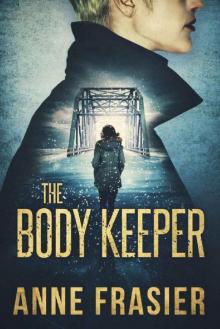 The Body Keeper
The Body Keeper Hush
Hush Play Dead
Play Dead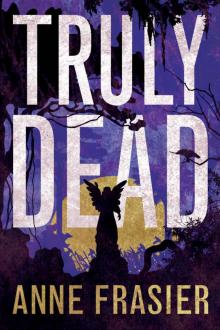 Truly Dead
Truly Dead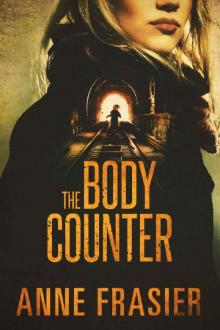 The Body Counter
The Body Counter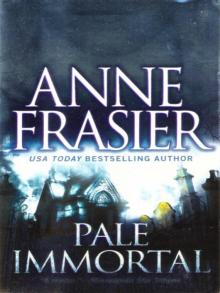 Pale Immortal
Pale Immortal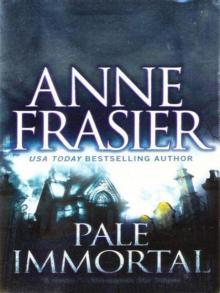 (2006) Pale Immortal
(2006) Pale Immortal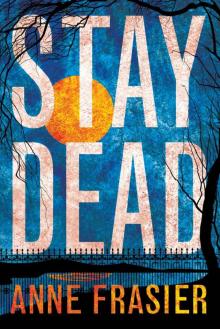 Stay Dead (Elise Sandburg series)
Stay Dead (Elise Sandburg series) Sleep Tight
Sleep Tight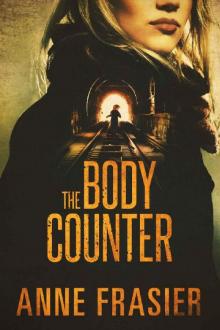 The Body Counter (Detective Jude Fontaine Mysteries Book 2)
The Body Counter (Detective Jude Fontaine Mysteries Book 2)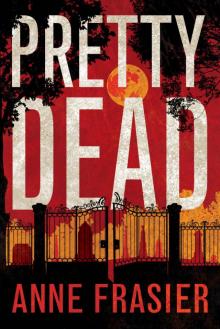 Pretty Dead
Pretty Dead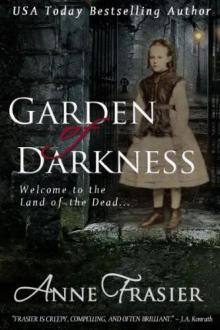 Garden of Darkness
Garden of Darkness